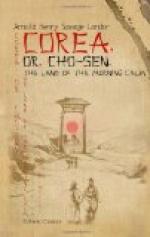One of the things which will not fail to impress a careful observer is the beauty of the Corean hand. The generality of Europeans possess bad hands, from an artistic point of view, but the average Corean, even among the lower classes, has them exceedingly well-shaped, with long supple fingers, somewhat pointed at the end; and nails well formed and prettily shaped, though to British ideas, grown far too long. It is not a powerful hand, mind you, but it is certainly most artistic; and, further, it is attached to a small wrist in the most graceful way, never looking stumpy, as so often is the case with many of us. The Coreans attach much importance to their hands; much more, indeed, than they do to their faces; and special attention is paid to the growth of the nails. In summer time these are kept very clean; but in winter, the water being very cold, the cleanliness of their limbs, “laisse un peu a desirer.” I have frequently seen a beautifully-shaped hand utterly spoilt by the nails being lined with black, and the knuckles being as filthy as if they had never been dipped in water. But these are only lesser native failings; and have we not all our faults?
The two qualities I most admired in the Corean were his scepticism and his conservatism. He seemed to take life as it came, and never worried much about it. He had, too, practically no religion and no morals. He cared about little, had an instinctive attachment for ancestral habits, and showed a thorough dislike to change and reform. And this was not so much as regards matters of State and religion, for little or nothing does the Corean care about either of these, as in respect of the daily proceedings of life. To the foreign observer, many of his ways and customs are at first sight incomprehensible, and even reprehensible; yet, when by chance his mode of arguing out matters for himself is clearly understood, we will almost invariably find that he is correct. After all, every one, whether barbarian or otherwise, knows best himself how to please himself. The poor harmless Corean, however, is not allowed that privilege. He, as if by sarcasm, calls his country by the retiring name of the “Hermit Realm” and the more poetic one of the “Land of the Morning Calm”; “a coveted calm” indeed, which has been a dream to the country, but never a reality, while, as for its hermit life, it has been only too often troubled by objectionable visitors whom he detests, yet whom, nevertheless, he is bound to receive with open arms, helpless as he is to resist them.
Poor Corea! Bad as its Government was and is, it is heart-rending to any one who knows the country, and its peaceful, good-natured people, to see it overrun and impoverished by foreign marauders. Until the other day, she was at rest, heard of by few, and practically forgotten by everybody, to all intents an independent kingdom, since China had not for many years exercised her rights of suzerainty,[4] when, to satisfy the ambition of a childish nation, she suddenly finds herself at the mercy of everybody, and with a dark and most disastrous future before her!




